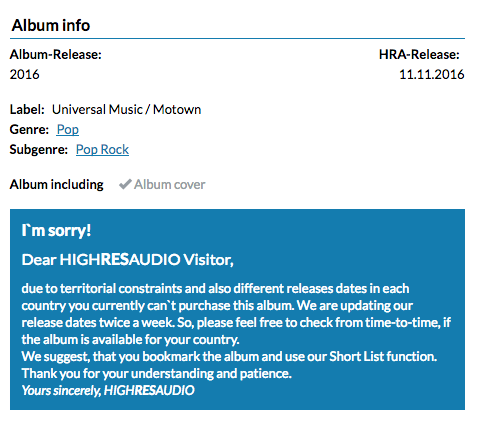Audiophile hardware… pardon, equipment, is expensive. Full stop.
It is a “given” that to enjoy “true” music you must allocate a budget that equals the purchase of a supercar otherwise, as Califano (an Italian singer) used to sing, tutto il resto ? noia (everything else is spleen.) But is it actually so?
Currently I’m listening some Antonio Vivaldi’s concerts played by Yo Yo Ma, in CD – quality (44/16) FLAC format through a couple of bookshelf B&W loudspeakers connected to my old (sorry again, “vintage”) amplifier that receive the analogue signal from a thunderbolt DAC made by? Zoom Japan. Not factoring the computer, the whole setup costs well below a thousand Euros and the quality is very good.
Of course an audiophile would strongly disagree with this statement. He would surely start talking about the superiority of the brand X’s amplifier or the absolute need of a thousand Euros-per-meter loudspeaker cable to have the music flows more “liquid” and so on. And he will rebuff with a pity look in his eyes whoever says something different: ignorant can’t actually understand the “truth”, so let them listen at their Iphone’s earbuds.
To some extent this audiophile is right: expensive rigs can produce awesome results. But a simple logic shows that this statement is wrong and doesn’t match the reality of the digital music industry.
First, it is false that an 100.000 Euros music set up sounds 100 times better than a 1.000,00 Euros one. The more you get close to physical limitation of whatever equipment, the price of each improving step raises more and more and the quality result is more and more less than proportional.
Second, the majority of the music labels still sells their music in CD quality, i.e. the 1980, Red Book standard (16 bit, 44Khz) and even those CD advertised as “24bit recorded” are actually downsampled to the usual standard. With vinyl there was some sense in purchasing costly turntables to minimize the impact of the moving parts on the quality of the electrical signal to be sent the amplifier. Digital files free us from this need. Sure, there are different quality level in digital-to-analogue conversions (DAC) hardware. But a lot of what is sold right now is just “whistles-and-bells”. Spending money for a DAC able to handle 24bit/192Khz or DSD128 streams is useless because, right now, none of the big music labels are releasing high resolution versions of their catalogue, limiting to a very little niche of contents. So where is the point in spending huge monies to buy something that is of no use?
Third (or, maybe, Second, continued), high resolution files make sense only if the music to be played contains a very high dynamic range (from the lows of drums and percussion to the highs of violins and triangle), high personality musical instruments and great players. “Dirty” music like blues (think of John Lee Hooker) or rock (Jimi Hendrix jumps in) is not enhanced by? “better” mastering, as there is no improvement in overmastering a Lady Gaga tune. Furthermore, a lot of the music available on the market is a “bookshelf product”, i.e. something that has been designed to be sold in a very short timeframe, just to be replaced by the next new “version”. Can you actually tell the (musical) difference in the “artistic” production of what is currently sold as “music”? It is not a coincidence that, more and more, “artists” are known more for their eccentricity or fashion look than for their “cultural” production. This is not a rant about how better was the good ol’time music, but a precise cost-benefit analysis: no need to invest in better recorded music, if what has to be sold doesn’t worth it and – more important – if the customer base is not willingly to pay the premium price.
Conclusion: a logic approach to the sound quality that involves a look at the marketing digital strategy of the music industry and the account of the Far East sound-handling devices’ quality shows that it doesn’t make sense to waste money into “audiophile level” equipment.
What we do need is just better music.


